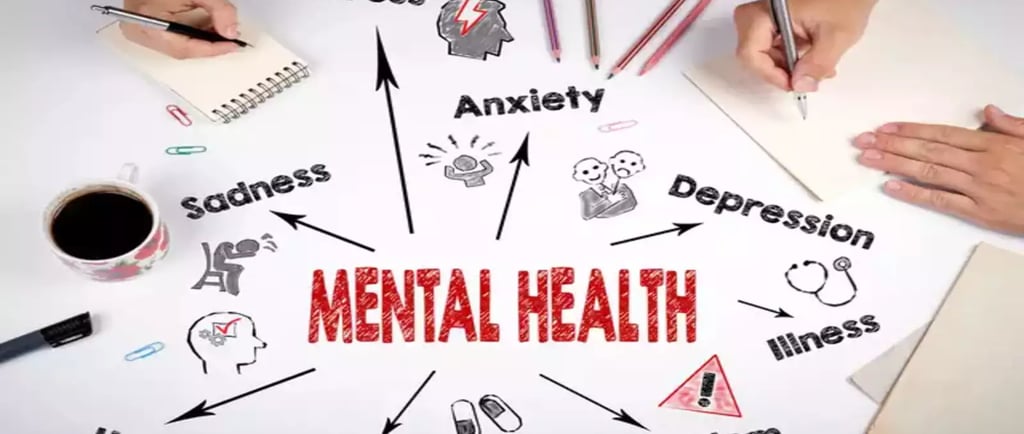5 Game-Changing Mental Health Initiatives Transforming Wellness in 2024
Discover the innovative approaches revolutionizing mental health care. From AI-powered therapy apps to nature prescriptions, this guide explores five groundbreaking initiatives making mental wellness more accessible, effective, and destigmatized. Learn how digital platforms, workplace programs, and community support are creating a new future for mental health and how you can get involved today
CURRENT NEWS


In our fast-paced, hyper-connected world, mental health has finally stepped into the spotlight, recognized as being just as critical as physical well-being. Yet, for too long, accessing care has been fraught with barriers: high costs, social stigma, and limited availability. The landscape of mental wellness, however, is undergoing a radical transformation.
A new wave of innovative, accessible, and effective initiatives is breaking down these old walls, offering hope and practical support to millions. These approaches leverage technology, community, and a deeper understanding of human psychology to meet people where they are. This article delves into five of the most impactful game-changers in mental health today, providing you with the knowledge to navigate and benefit from this new era of care.
1. Digital Mental Health Platforms: Therapy in Your Pocket
The rise of smartphones has catalyzed a revolution in accessibility, and mental health care is no exception. Digital platforms have democratized access to tools and resources that were once exclusive to therapist's offices.
What They Offer:
Guided Meditations & Mindfulness: Apps like Headspace and Calm offer structured programs for stress reduction, sleep improvement, and anxiety management. These sessions, often just 10 minutes long, teach users to anchor themselves in the present moment, breaking the cycle of rumination and worry.
AI-Powered Therapy Chatbots: Tools like Wysa and Woebot provide 24/7 support through conversational AI. Using principles of Cognitive Behavioral Therapy (CBT), these chatbots help users challenge negative thought patterns, track mood, and develop coping skills in real-time, anytime a crisis strikes.
Personalized Mental Health Tracking: Many platforms include journaling and mood-tracking features, allowing users to identify triggers, monitor progress, and gain valuable self-awareness about their mental health patterns.
Why It's a Game-Changer:
The beauty of these platforms lies in their ability to remove traditional barriers. They eliminate the fear of judgment by providing anonymity, are available at any hour for those with irregular schedules, and are often more affordable than traditional therapy. They serve as both a first step for the hesitant and a valuable supplementary tool for those already in care.
2. Workplace Mental Health Programs: Investing in Human Capital
Progressive companies have realized that employee well-being is not a perk—it's a fundamental driver of sustainability, creativity, and productivity. The corporate world is now a front line in the fight for better mental health.
What They Offer:
Mandatory Mental Health Days: Companies are moving beyond unlimited PTO to specifically encourage days off dedicated to mental restoration, actively discouraging the culture of "powering through" burnout.
Free Counseling Sessions: Through Employee Assistance Programs (EAPs), employees and their families can access short-term, confidential counseling for free, covering everything from work stress to family issues.
Designated Quiet & Relaxation Rooms: Offices are incorporating dedicated spaces for meditation, prayer, nursing, or simply a few minutes of quiet escape from the open-office hustle.
Pioneers and Proof:
Tech giants like Google and Microsoft have been trailblazers, offering extensive wellness resources, on-site counselors, and resilience training. Their data shows a clear return on investment: reduced absenteeism, lower healthcare costs, and significantly higher employee engagement and retention. They prove that caring for employees' minds is simply good business.
3. Community Support Groups: The Power of Shared Experience
While technology offers scale, the healing power of human connection remains irreplaceable. Community support groups, both online and offline, provide a unique form of solace that professional therapy alone sometimes cannot.
What They Offer:
Platforms like Meetup (for in-person connections) and 7 Cups (for online, listener-based support) facilitate communities for virtually every challenge:
Anxiety and Depression Support Circles: Safe spaces to share struggles and victories without fear of misunderstanding.
Grief Counseling Groups: Connecting those who have experienced loss, providing comfort from others who truly comprehend the journey.
Addiction Recovery Networks: Offering accountability, shared wisdom, and hope from those walking the same path.
The Power of Shared Experience:
These groups combat the profound isolation that often accompanies mental health struggles. Hearing someone else articulate your exact feelings validates your experience and reduces shame. The principle of "peer support" is powerful: receiving help from those with lived experience fosters a deep, unique level of trust and understanding.
4. School-Based Social-Emotional Learning (SEL): Building Resilience from the Ground Up
The most profound impact on future mental wellness may be happening in our schools. Social-Emotional Learning integrates the development of emotional intelligence into core education, arming children with skills for life.
What It Teaches:
Emotional Intelligence: Identifying, understanding, and managing one's own emotions, as well as recognizing and empathizing with the emotions of others.
Mindfulness in the Classroom: Short, age-appropriate exercises that help students focus, regulate big emotions, and reduce anxiety.
Comprehensive Anti-Bullying Programs: These initiatives now often include mental health components, teaching empathy, conflict resolution, and the emotional impact of bullying.
The Long-Term Impact:
The goal is prevention. By teaching children how to navigate friendship conflicts, manage test anxiety, and practice self-compassion, we equip them with a toolkit to handle future stressors. This proactive approach can reduce the incidence of severe anxiety, depression, and other mental health disorders later in life, creating a more emotionally resilient generation.
5. Nature Therapy Initiatives: The Great Outdoors as Healer
Sometimes the best medicine doesn't come from a bottle or a screen; it comes from the natural world. "Ecotherapy" is a growing field based on the scientifically-backed idea that spending time in nature is profoundly healing.
What It Looks Like:
Initiatives like "Park Prescriptions" are gaining traction, where healthcare providers literally prescribe time in parks for patients dealing with anxiety, depression, or high stress. Other programs organize structured group walks in nature for therapy.
The Science Behind It:
Studies, including one from the University of Michigan, have shown that spending just 20 minutes in a natural setting can significantly lower cortisol levels (the primary stress hormone). Nature exposure has been linked to:
Reduced symptoms of anxiety and depression
Improved focus and cognitive function (a benefit for those with ADHD)
Enhanced mood and overall sense of well-being
This isn't just about exercise; it’s about the calming, restorative effect of being in a green, blue, or natural space, which helps to quiet the mind's constant chatter.
How You Can Get Involved and Take Action Today
This new landscape of mental health is participatory. Here’s how you can engage right now:
Experiment with an App: Commit to using one mental health app (like Headspace or Wysa) for just 5-10 minutes every day for one week. Notice the impact on your stress levels.
Advocate at Work: Speak to HR about implementing mental health days, starting an EAP, or creating a quiet room. Share articles about the productivity benefits of wellness programs.
Find Your Community: Search Meetup or 7 Cups for a support group related to a challenge you face. Listening alone can be a powerful first step.
Prescribe Yourself Nature: Schedule 20-minute "nature breaks" three times a week. Go to a park, walk under trees, or sit by a body of water.
Break the Stigma: Share articles like this one or talk openly about your own mental wellness journey. Your openness gives others permission to seek help.
